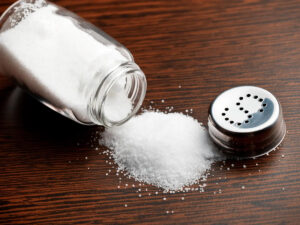3. Table Salt
Salt is essential for our health. It helps regulate our blood pressure, control fluid balance, and helps our muscles and nerves function correctly. It can also be used as a remedy for heat stroke, soothe sore throats and treat tooth and gum issues. But even though it’s an important part of our diet, too much can cause a lot of damage. Table salt is a very common staple in many households all over the world but is considered to be the least healthy type of salt.

Table salt is a manufactured form of salt. Comprised mostly of sodium chloride, it’s similar to natural sea salt but is created by taking natural salt and cooking it at 1200?, which strips it of all the important minerals. There are many different additives found in table salts, such as synthetic chemicals like iodide, sodium bicarbonate, fluoride, and anti-caking agents, as well as toxic amounts of potassium iodide and aluminum.
Diets high in table salt increase the chances of developing renal stones and can worsen health issues like diabetes and obesity. Continuing to ingest high volumes can potentially cause kidney and liver problems, as well as hypertension, heart disease, water retention, stroke and heart failure.
The general recommendation of daily salt intake is no more than 6 grams or one teaspoon. With today’s processed foods and soda beverages, it’s extremely easy to go over that recommended amount. Vigilance is required to ensure you eat as organically as possible, because the less processed a product is, the less table salt it will have.
4. Caffeine

Caffeine is a natural stimulant, found in many different foods and drinks like coffee, tea, cocoa, and chocolate. The Food and Drug Administration (FDA) consider caffeine to be both a drug and food additive, and it is likely to be the world’s most popular stimulant. According to the 2013 online survey conducted by the National Coffee Association, over 587 million cups of coffee are drunk per year in the US alone. But even though caffeine is a popular pick-me-up, there can be detrimental side effects.
Because caffeine is a stimulant, it speeds up the central nervous system, making the brain send and receive messages at a faster rate than usual. Excessive amounts can cause an increase in body temperature, high blood pressure, dizziness, headaches, heart palpitations, jitters, restlessness, and insomnia.
Read Also: Sovcomflot Selling Its’ Fleet To Meet Banks Obligations
Caffeine can be found in many things, from soda beverages to prescription medication, and when ingested, it can cause the kidneys to become dehydrated, in turn making them work harder to pump out more fluids. Caffeine also stimulates blood flow, which places additional stress on the kidneys, and this can also increase blood pressure.
Though caffeine has many health benefits as well, such as weight loss, added alertness, higher brain function and better cognitive thinking, experts say around 200-300 milligrams of caffeine each day is enough.
And when tracking your caffeine intake, keep in mind that it applies to all foods and drinks that include caffeine – not just coffee.
*To be concluded
Kindly like us on Facebook














